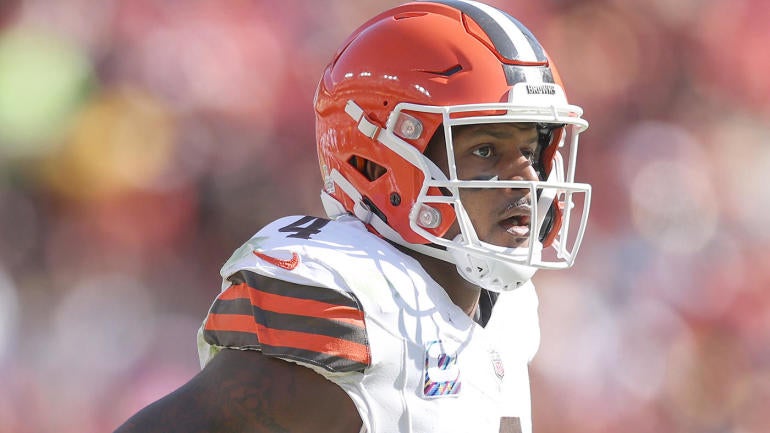
The Cleveland Browns made history when they acquired Deshaun Watson prior to the 2022 season. Not only did the team trade three first-round picks to add the quarterback, but it then immediately signed him to an unprecedented fully guaranteed five-year, $230 million contract.
Two years later, the partnership hasn't exactly gone as planned.
Watson's 2022 debut was always going to have an asterisk after the veteran missed the first 11 games due to suspension for an alleged pattern of sexual misconduct. But he had career-worst production in the games that followed, completing just 58% of his throws in a six-game stretch.
Things have only gotten muddier since, with Watson sandwiching sloppy performances between injury-related absences; he barely stayed on the field for six games in 2023, and his 2024 appears over after suffering an Achilles injury in Week 7 against the Bengals,
The Watson who once looked like a long-term face of the NFL has been mostly invisible. Only 10 quarterbacks currently make more money per year, and three of them have either won NFL MVP or appeared in a Super Bowl. It's only fair if Browns fans are wondering: Is it possible to get out of Watson's controversial contract? Is it even feasible for Cleveland to look ahead at quarterback?
Impact of cutting Watson before deal expires
If the Browns were to outright release Watson after 2024, per Over the Cap, they'd instantly lose $99.8 million, or roughly 36% of the entire projected 2025 salary cap. That cannot and will not happen.
Even if they were to designate him a post-June 1 cut, the net loss would be $46 million -- also unfathomable. Barring a complete and total restructure on Watson's end (which seems highly unlikely, considering his representation specifically negotiated a fully guaranteed deal that even included workarounds for his 2022 suspension), the soonest the Browns could cut Watson without losing tens of millions is 2026, the final year of his deal.
In that scenario, a post-June 1 cut after the 2025 season would result in a dead-cap hit of $72.9 million (the current record is $85 million, which the Denver Broncos absorbed by releasing Russell Wilson this past offseason), but the Browns would at least avoid an immediate loss of 2026 cap space. Because Watson's deal is fully guaranteed, remember, there is technically no scenario where the team can release the quarterback and save cap space.
Two unlikely alternatives
There are, however, two unlikely alternatives. The first, and most improbable, is a trade. But that would require another team inheriting Watson's unprecedented contract, complete with his on- and off-field baggage. "Salary-dump" deals aren't totally unprecedented in the NFL, but even that possibility -- of the Browns essentially paying another team to unshackle them from Watson's deal -- seems remote, considering his cap charges and new injury. Just look at how Wilson exited Denver; that's a Super Bowl-winning quarterback with nowhere near the character concerns, and yet the Broncos' commitment to Wilson all but prevented them from shopping his contract after disappointing 2022-2023 seasons.
If cutting or trading Watson isn't realistic, then where can the Browns find solace? To be frank, their bed was made the minute they executed the Watson trade-and-extension. No amount of cap manipulation can easily erase that decision. But if Watson truly cannot return to form as a quarterback, either under the current regime or a new one, the last scenario involves him simply and indefinitely taking a seat as the highest-paid backup in the history of the NFL.
A permanent demotion of Watson would require Cleveland to have a legitimate alternative, which is an entirely different issue considering how much money the team already has tied to the position. And that's not accounting for money-allocation at other important positions. For example, how could they expect to field a premium offensive line or skill group if they're trying to compensate both Watson and another starting quarterback? At least, if it truly reached that point, and if Watson hadn't renegotiated to expedite his exit by that point, they'd be admitting the Watson money wasn't well spent, and giving another signal-caller a chance.

















